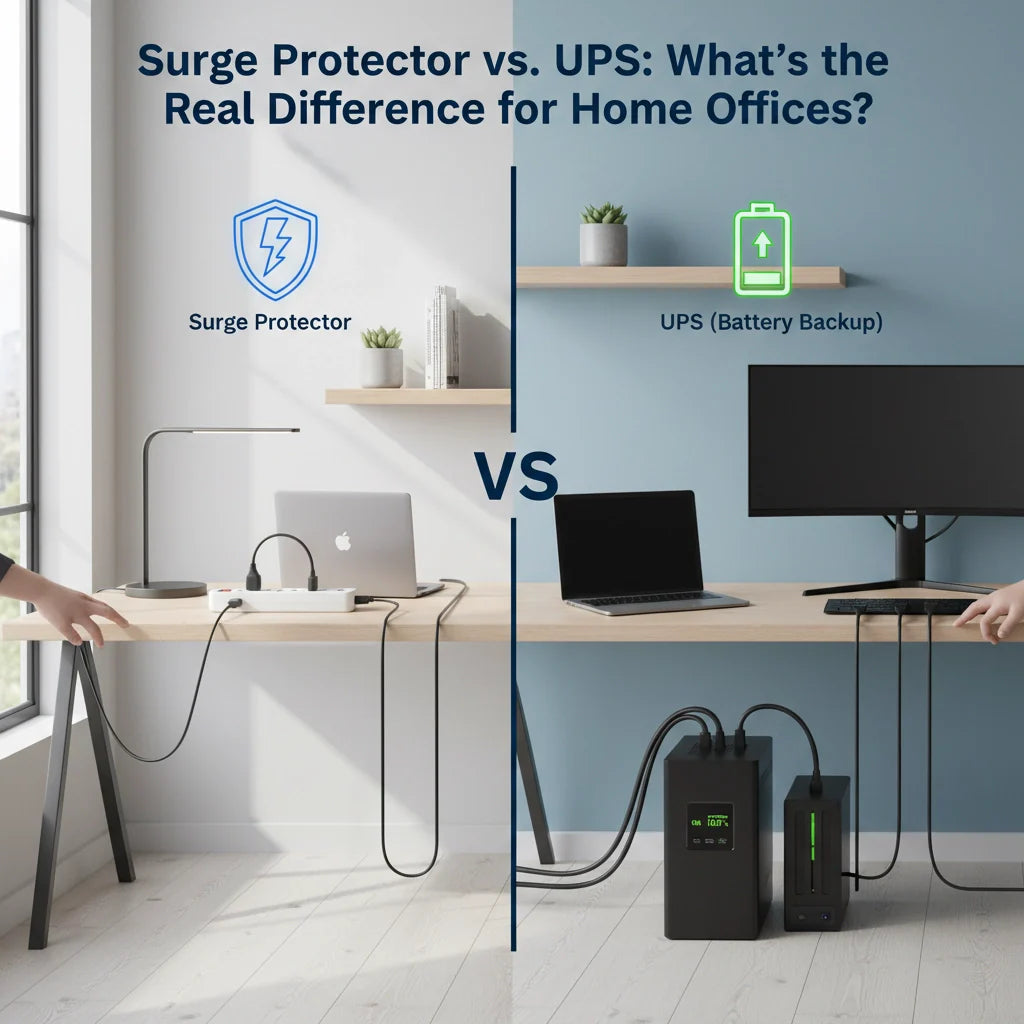
Surge Protector vs. UPS: What's the Real Difference for Home Offices?
Share
Setting up a home office means making decisions about protecting your valuable equipment and ensuring uninterrupted productivity. Two devices often come up in these discussions: surge protectors and UPS (Uninterruptible Power Supply) systems. While both relate to power protection, they serve distinctly different purposes that can make or break your work-from-home experience.
The fundamental difference is simple: surge protectors shield your devices from voltage spikes, while UPS systems provide backup battery power during outages (plus some surge protection). Understanding this distinction is crucial for making the right choice for your home office setup.
What Surge Protectors Actually Do
Surge protectors are your first line of defense against voltage spikes that can fry expensive electronics. They work by using components like Metal Oxide Varistors (MOVs) to detect when voltage exceeds safe levels and then divert that excess electricity to your home's grounding system.
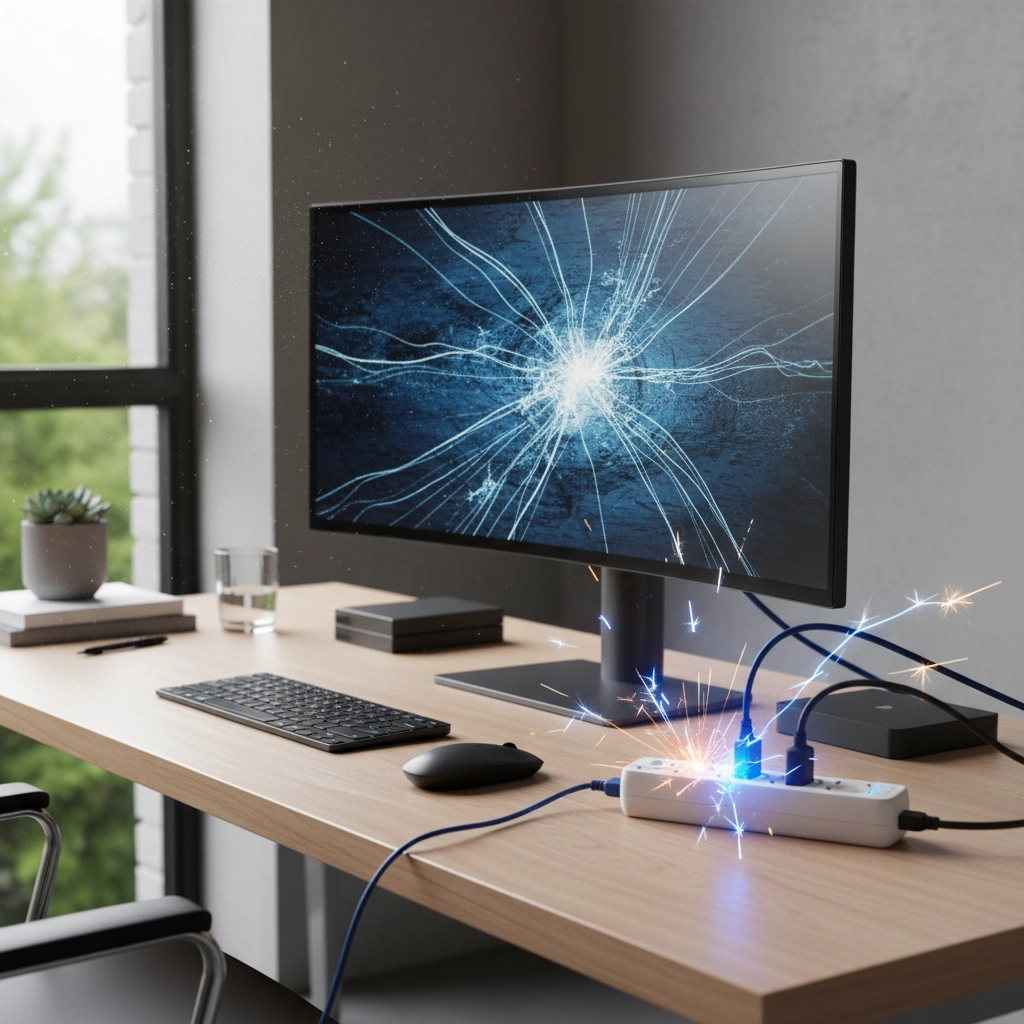
These voltage spikes happen more often than you might think:
- Lightning strikes (even distant ones)
- Power company switching operations
- Large appliances cycling on and off
- Faulty wiring in your neighborhood
When a surge occurs, your surge protector essentially takes the hit instead of your computer, monitor, or router. However, here's the critical limitation: surge protectors provide zero backup power during outages. When the lights go out, your devices shut down immediately, potentially causing data loss and file corruption.
Quality surge protectors also have joule ratings that indicate how much energy they can absorb before they're overwhelmed. A typical home office setup should look for surge protectors rated at least 1,000 joules, though higher ratings provide better long-term protection.
How UPS Systems Keep You Running
A UPS takes a completely different approach to power protection. Its primary job is providing backup power through an internal battery system, allowing your devices to keep running when the power goes out. The moment a UPS detects power loss, it automatically switches to battery mode – often so quickly that your equipment doesn't even notice the transition.
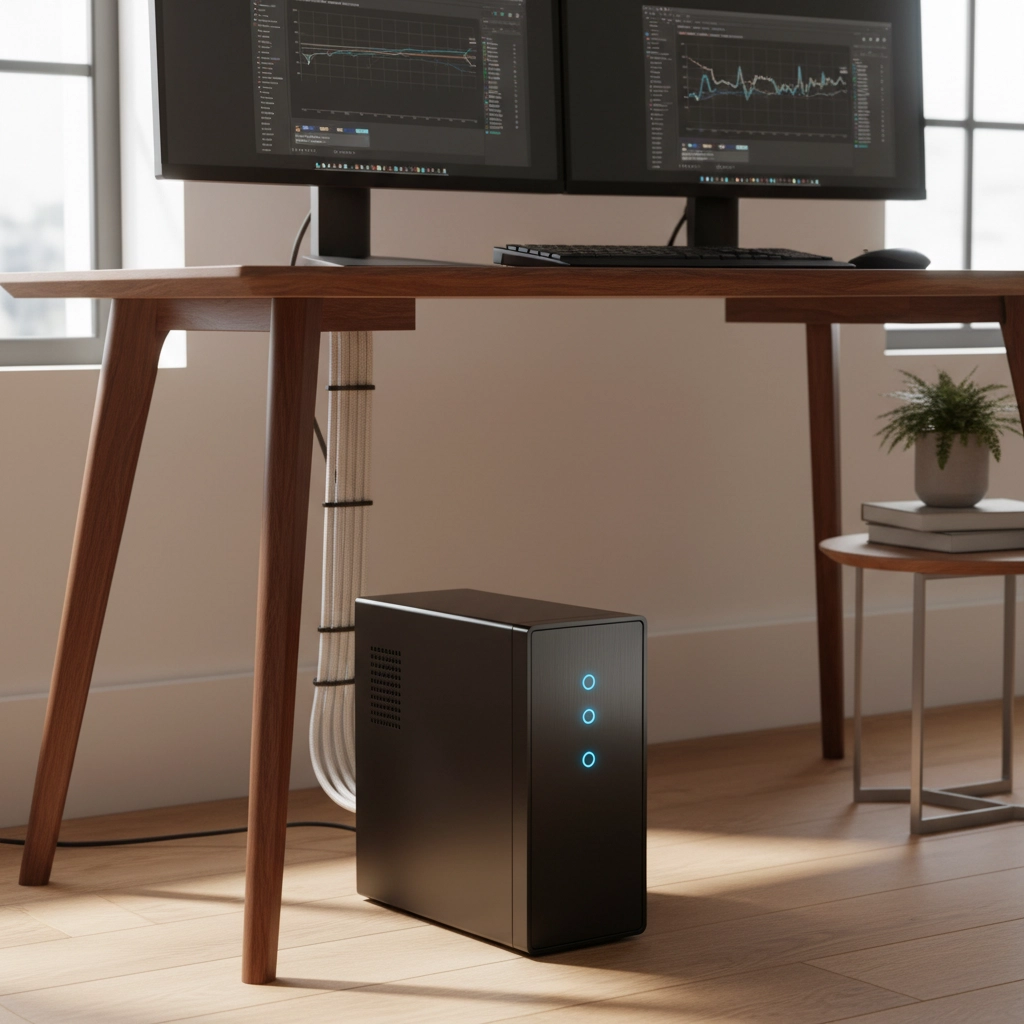
This backup power serves several critical functions:
- Prevents data loss by giving you time to save work and properly shut down
- Maintains productivity during brief outages
- Protects against file corruption that happens with sudden power cuts
- Keeps networking equipment running so you stay connected
Most UPS systems also include built-in surge protection, but here's an important caveat: UPS devices typically provide inferior surge protection compared to dedicated surge protectors. They're designed primarily for power continuity, not robust surge suppression.
Breaking Down the Key Differences
Let's look at how these devices stack up for typical home office needs:
Power Outage Protection:
- Surge protector: Your equipment shuts down immediately
- UPS: Continues running on battery power (typically 5-30 minutes depending on load)
Surge Protection:
- Surge protector: Excellent protection against voltage spikes
- UPS: Basic surge protection, not suitable as primary defense against major surges
Data Protection:
- Surge protector: No protection against data loss during outages
- UPS: Prevents data loss and corruption from sudden shutdowns
Cost:
- Surge protector: $20-100 for quality units
- UPS: $100-500+ depending on capacity and features
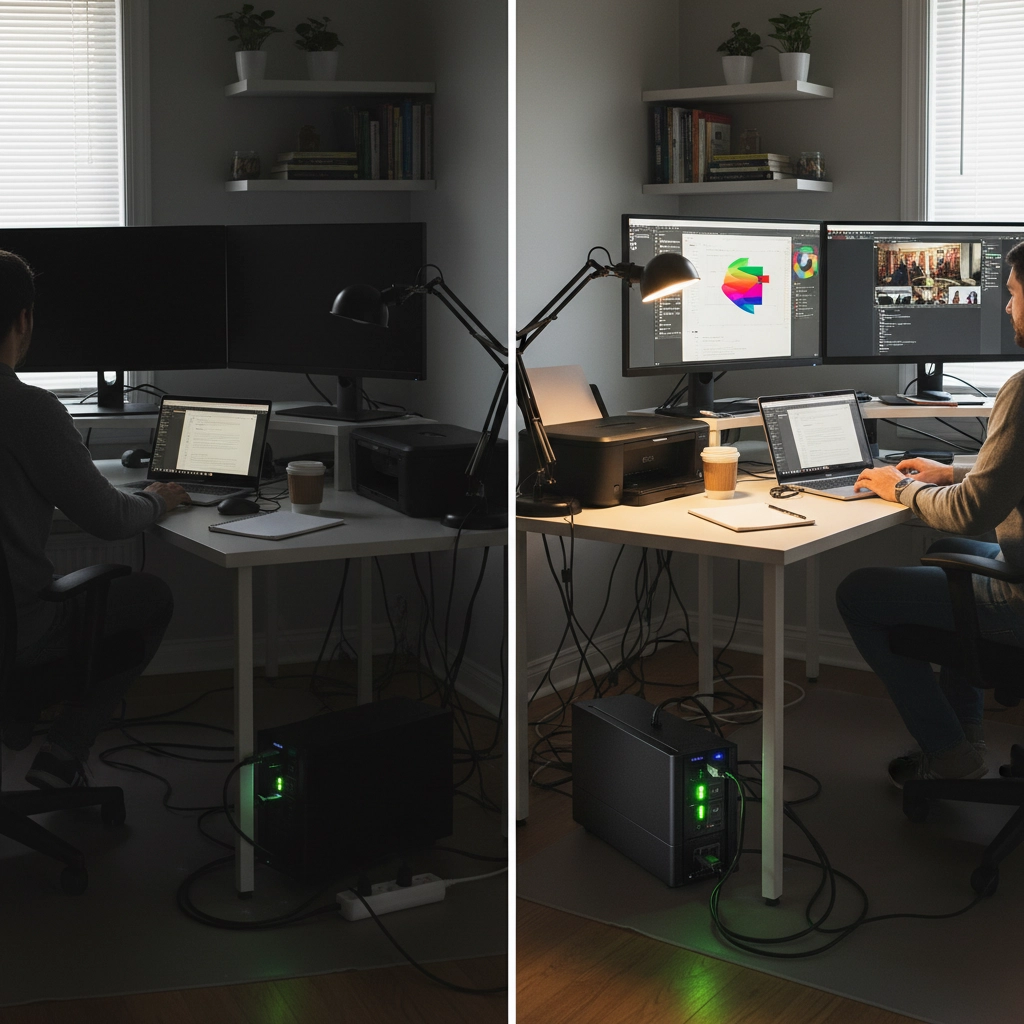
Choosing the Right Solution for Your Home Office
The decision ultimately comes down to your specific situation and priorities.
Go with a UPS if you:
- Experience frequent power outages in your area
- Work with important files that can't afford corruption
- Conduct video calls or online meetings regularly
- Use a desktop computer (laptops have built-in batteries but benefit from UPS protection too)
- Run a home-based business where downtime costs money
A surge protector might suffice if you:
- Rarely experience power outages
- Primarily use laptops with good battery life
- Main concern is protecting equipment from damage
- Work in an area with stable power but occasional voltage spikes
For maximum protection, many home office users combine both devices. You can plug a high-quality surge protector into the wall, then connect your UPS to the surge protector. This gives you robust surge protection plus battery backup – the best of both worlds.
Brand Options to Consider
When shopping for either device, several manufacturers stand out for reliability and performance. APC by Schneider Electric offers comprehensive UPS solutions ranging from basic home office models to enterprise-grade systems. Their Smart-UPS series provides excellent battery backup with network management capabilities.
CyberPower delivers solid value in both surge protectors and UPS systems, often at more budget-friendly price points without sacrificing essential features. Their Pure Sine Wave UPS models work particularly well with sensitive electronics.
For surge protection specifically, look for devices with indicator lights that show when protection is active and when it's been compromised. Many quality surge protectors will shut off power completely when their protection circuits are damaged, preventing false confidence in failed protection.
Advanced Considerations
Some UPS systems offer additional features worth considering for serious home office setups:
Automatic Voltage Regulation (AVR): Corrects minor voltage fluctuations without switching to battery power, extending battery life while providing cleaner power to your equipment.
Network Management: Higher-end models can send alerts to your computer or smartphone about power events, battery status, and system health.
Hot-Swappable Batteries: Allow you to replace worn batteries without shutting down connected equipment.
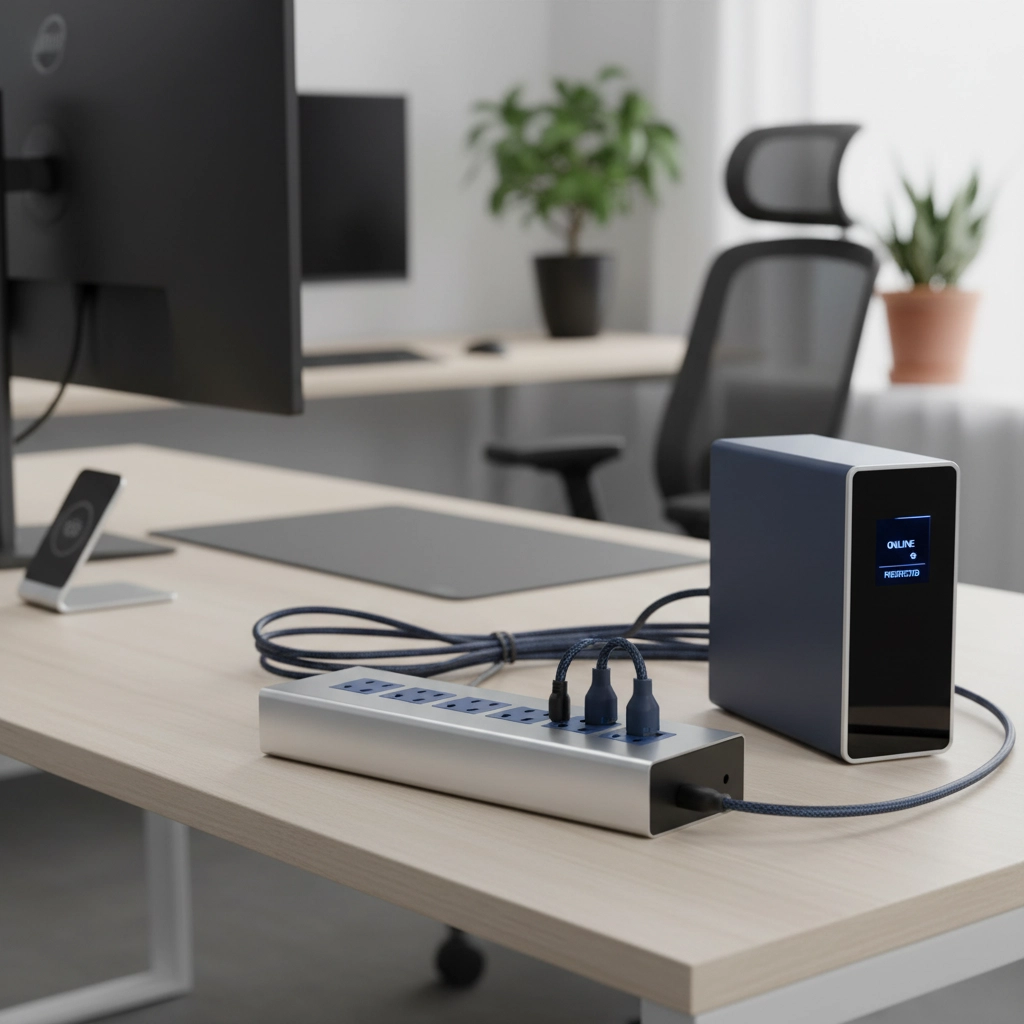
The Bottom Line
For most home offices, a quality UPS provides better overall protection than a surge protector alone. The peace of mind knowing you won't lose work during unexpected outages usually outweighs the higher upfront cost. However, if you're in an area with rock-solid power reliability and primarily concerned about equipment protection, a high-quality surge protector might meet your needs.
Remember that power protection is an investment in your productivity and equipment longevity. Whether you choose a surge protector, UPS, or combination of both, don't go cheap on devices protecting expensive computers and critical work files.
At Ace Real Time Solutions, we help home office professionals and small businesses select the right power protection solutions for their specific needs. Our team understands that reliable power protection isn't just about equipment – it's about maintaining productivity and protecting the work that matters to you.
Ready to protect your home office setup? Contact our team to discuss your power protection needs and find the solution that keeps your business running smoothly, no matter what the power grid throws your way.
